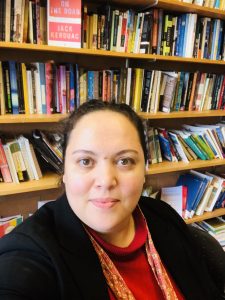From: Cheryl Regehr, Vice-President & Provost
Susan McCahan, Vice-Provost, Innovations in Undergraduate Education
Date: June 18, 2020
Re: 2019-20 Recipients of the Early Career Teaching Award and Teaching Fellowship (PDAD&C #84)
We are delighted to announce the recipients of the 2019-20 University of Toronto Early Career Teaching Award. In addition to congratulating this year’s recipients, we would like to thank the nominators for their work in preparing submissions. We would also like to thank the members of the selection committee for their dedication to recognizing excellence in teaching at the University of Toronto.
University of Toronto Teaching Fellowship: 2019-20
The University of Toronto Teaching Fellowships provide funds for up to five faculty members in the teaching stream focused on supporting pedagogical innovation and research, and intended to promote emerging leaders. The Fellowship is an opportunity for faculty members to undertake a two-year teaching and learning project centered on either curriculum review or renewal, or course redesign/development, working closely with the Office of the Vice-Provost, Innovations in Undergraduate Education and the Centre for Teaching Support & Innovation (CTSI).

Maria Assif
Associate Professor, Teaching Stream
Department of English
University of Toronto Scarborough
Professor Maria Assif is an Associate Professor, Teaching Stream in the Department of English at the University of Toronto Scarborough, the Coordinator of English A02 (Critical Writing about Literature) and the Faculty Advisor of the UTSC/OISE joint Program (B.A. in English and Master of Teaching). She is also the Faculty Advisor of the only Canadian chapter of Sigma Tau Delta, the International English Honor Society. Before joining the University of Toronto Scarborough in 2008, Professor Assif received her Ph.D. in English from Case Western Reserve University, with a triple concentration in American Literature, Rhetoric and Composition Studies.
Professor Assif has taught a variety of undergraduate and graduate writing and literature courses. Her research focuses primarily on writing studies, composition pedagogy and Arab women writers. Professor Assif signed with Oxford University Press to publish a new textbook, Beyond the Five Paragraph Essay (expected release in 2021); she is also finishing up the first critical database about Arab women’s writings. Both manuscripts showcase writing productions by some of Professor Assif’s undergraduate students at UTSC. Her other publications have appeared in tens of journals and anthologies. Professor Assif is the recipient of many research and teaching awards, including the TEDxUTSC 2016 “Dare to Know” Participation, the UofT Idered Campaign award, 2011 UTSC’s The Underground Best Professor of the Year, The Middle East Excellence Award Institute in Education Nomination, TVO Best Lecturer Series Nomination, Top Five Educators in Illinois, The Fulbright Scholarship, the Melon and Adrian research fellowship, and the Dean’s special awards.

Kerry Taylor
Assistant Professor, Teaching Stream,
Centre for Criminology and Sociolegal Studies
Faculty of Arts and Science
Professor Taylor joined the Centre for Criminology and SocioLegal Studies (CrimSL) in the Faculty of Arts and Science in 2016, as an Assistant Professor, Teaching Stream.
Professor Taylor taught in the Woodsworth College Academic Bridging Program, an access-based program offering a wide-range of individualized academic supports and critical skills development. At present, she uses socio-legal and holistic methods and theories to teach in CrimSL in the areas of penology/abolition, bioethics, human rights, Indigenous/settler relations and legal pluralism, interpersonal violence, immigration, and youth justice. Professor Taylor is also working with University of Toronto Ethics Society and Law colleague, Professor Simone Weil Davis, to create experiential co-learning opportunities for University of Toronto and incarcerated students within Ontario correctional facilities.
Professor Taylor’s fellowship will focus on the design of a fourth-year undergraduate course which expands upon her existing third-year, “Indigenous Peoples and Criminal Justice” offering. It will be structured around enhanced experiential and community-led learning and land-based pedagogy, which will offer students the opportunity to challenge their own understandings of about law, settler colonialism, crime, justice and Indigenous ways of knowing and being. Working in collaboration with the faculty of Indigenous Studies, Professor Taylor plans to develop relationships between Indigenous communities and University of Toronto CrimSL students rooted in relevance, respect, reciprocity, and responsibility. She will engage storytelling methodologies to share how students translate their own ways of coming to know about who they are, and what their responsibilities are towards this land and its original peoples.
University of Toronto Early Career Teaching Award
This award recognizes faculty members who demonstrate an exceptional commitment to student learning, pedagogical engagement and teaching innovation. Up to four awards of $3,000 are offered annually.

Jill Carter
Assistant Professor
Centre for Drama, Theatre, and Performance Studies
Faculty of Arts and Science
Professor Jill Carter joined the Centre for Drama, Theatre, and Performance Studies in 2016 and is cross-appointed to the Transitional Year Programme and the Centre for Indigenous Studies. An Anishinaabe-Ashkenazi researcher and theatre-worker, she works with many Indigenous artists to support the development of new works and to disseminate artistic objectives, process, and outcomes through community-driven research projects. Her scholarly research, creative projects, and activism are built upon ongoing relationships with Indigenous Elders, scholars, youth, artists and activists. The research questions she pursues revolve around the mechanics of story creation, the processes of delivery and the manufacture of affect.
As an educator, she views herself as a fellow sojourner on the learning path. As one who may have a little more familiarity with the subject-topography than do her students, she takes seriously the responsibility to guide their steps away from dangerous precipices and dead ends and towards doorways that open out onto safe learning spaces where they can discover and exercise their own unique gifts and know their own power. Many of the courses, we are called upon to facilitate are laden with “difficult” content—painful histories, the consequences of which are embodied by many of the young scholars who pass through our lecture halls, labs, and rehearsal studios. Hence, she works to be proactive in adopting, adapting and creating models for curriculum delivery that facilitate positive transformation and empowerment.
Apart from her teaching and academic writing, Jill is a performer with the Talking Treaties Collective; a researcher and tour guide with First Story Toronto; and a facilitator of Land Acknowledgement Workshops for theatre makers in this city.

Andrea Charise
Assistant Professor
Interdisciplinary Centre for Health & Society, University of Toronto Scarborough and
Graduate Department of English, Faculty of Arts and Science
Professor Andrea Charise joined the University of Toronto Scarborough’s Interdisciplinary Center for Health & Society in 2014. Her primary research and teaching interests are in the field of Health Humanities, with a focus on aging, older age, and intergenerational relationships; and English literature, especially the novel and nineteenth-century British writing. In addition to receiving awards for her scholarship in literature, including the 2014 John Charles Polanyi Prize, Dr. Charise has almost twenty years of work experience as a medical researcher, primarily in geriatrics.
Professor Charise’s pedagogical approach involves integrating skills traditionally associated with humanities disciplines—including close reading, oral and written communication, visual literacy, and narrative analysis—as a vital complement to conventional health knowledge, research, and learning. She is the founding program supervisor of Canada’s first undergraduate program in Health Humanities (www.scopelab.ca), and she is regularly invited to consult on Health Humanities program-building initiatives across North America. Her peer-reviewed research regularly integrates the scholarship of teaching and learning, including pedagogically-focused publications in Journal of Medical Humanities, Teaching Health Humanities (Oxford University Press) and, most recently, a qualitative study–co-authored with her students–of undergraduate student experiences in Canada’s first Health Humanities program (published open-access in Advances in Health Science Education, 2020). In 2016 she was named “Professor of the Year” (Arts, Literature, and Language) by the UTSC student journal The Underground, and in 2019 she received one of three campus-wide UTSC Teaching Awards at the Assistant Professor level.

Rachel La Touche
Assistant Professor, Teaching Stream
Department of Sociology
Faculty of Arts and Science
Professor La Touche joined the Sociology Department in 2016. Her research is founded on questions of inequality, mental health, education, and teaching pedagogy – broadly addressing how institutions of higher education structure the mental health experiences and outcomes of those within them. She is currently working on a collaborative project studying the socio-psychological impact of student evaluations of teaching (SETs) on faculty across Canada.
In addition, she boasts an interdisciplinary and international teaching background, having taught for Indiana University-Bloomington, the University of Mannheim-Germany, Hanover College, and the Inter-University Consortium for Political and Social Research (ICPSR) at the University of Michigan. At present, Professor La Touche teaches and mentors UofT undergraduate and graduate students through a range of course offerings, TA training opportunities, and department workshops. Beyond UofT, she runs programming for partner institutions in engaged pedagogy, publishes in the Scholarship of Teaching and Learning (SoTL), and volunteers as a tutor for a non-profit, after-school program. Her commitment to accessible and engaged teaching approaches have been recognized with numerous awards, including the University of Toronto Dean’s Excellence Award (2017, 2018, and 2019).

Suzanne Wood
Assistant Professor, Teaching Stream
Department of Psychology
Faculty of Arts and Science
Professor Suzanne Wood joined the Department of Psychology in 2014. Her background in psychology, behavioural neuroscience, and psychopharmacology informs her present research and teaching pursuits. Professor Wood works directly with undergraduate researchers on topics related to student learning and health, including the use of study drugs and psychedelics as cognitive enhancers. She engages with her students as research partners, encouraging them to take leadership roles on their projects and see the research process through from its beginning to its end. She has received several small grants in support of her research pursuits from the University of Toronto Faculty of Arts and Science, as well as the Society for the Teaching of Psychology. She has disseminated the findings of her work through a number of conference presentations and peer-reviewed publications.
Professor Wood teaches courses ranging in size from small labs and seminars to large lecture courses. She is committed to engaging her students in authentic learning, tailoring each experience to meet the needs of the specific class. She has organized in-class events, such as hosting high-profile, local guest speakers in her classes to discuss drug policy and addiction; or borrowing human brain specimens to show students a real-life example of what they typically only see in their textbooks. Professor Wood has also taken her students outside of the classroom to explore career options in the sciences that do not align with the traditional academic path. Professor Wood had a circuitous career path, herself, and is particularly interested in engaging her students in practicing skills that will help them in their future – whether that be postgraduate studies or the workforce.